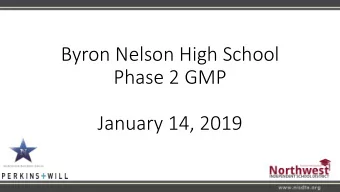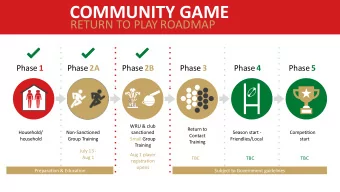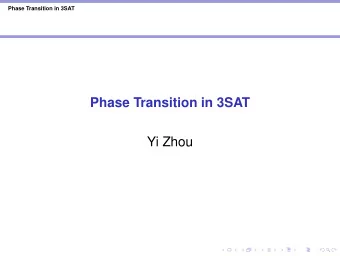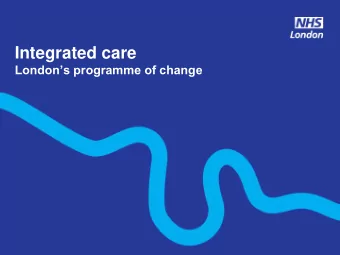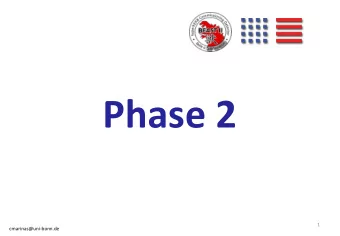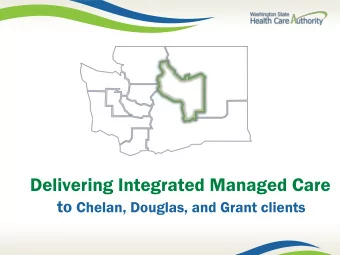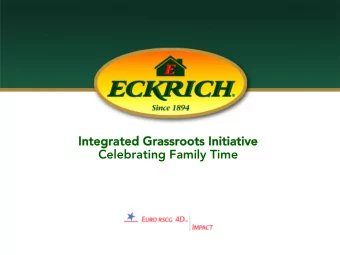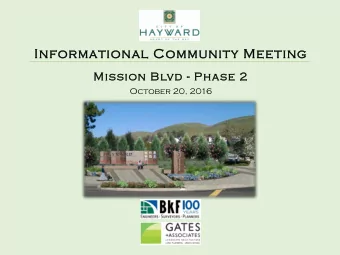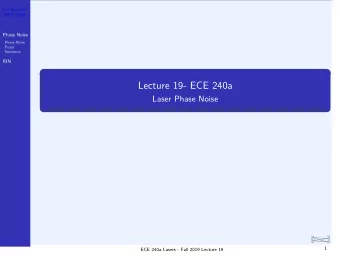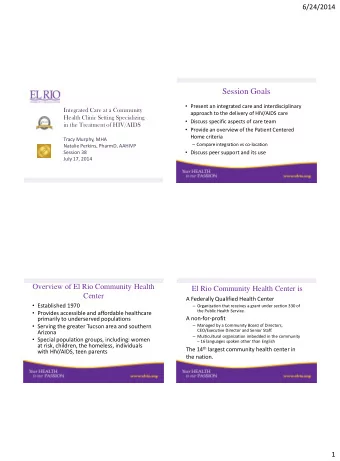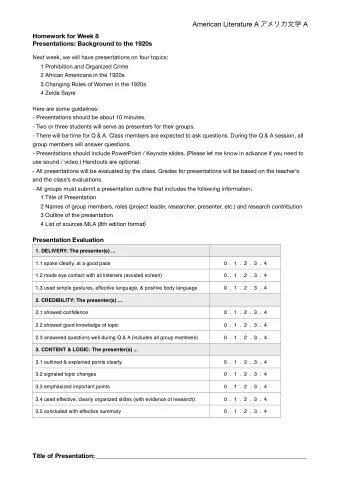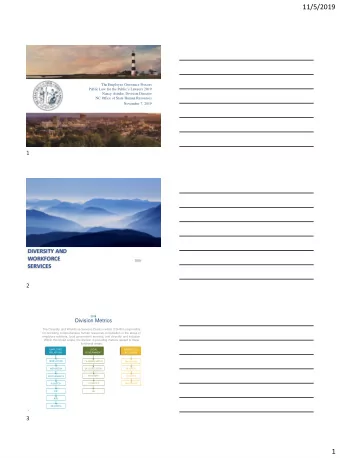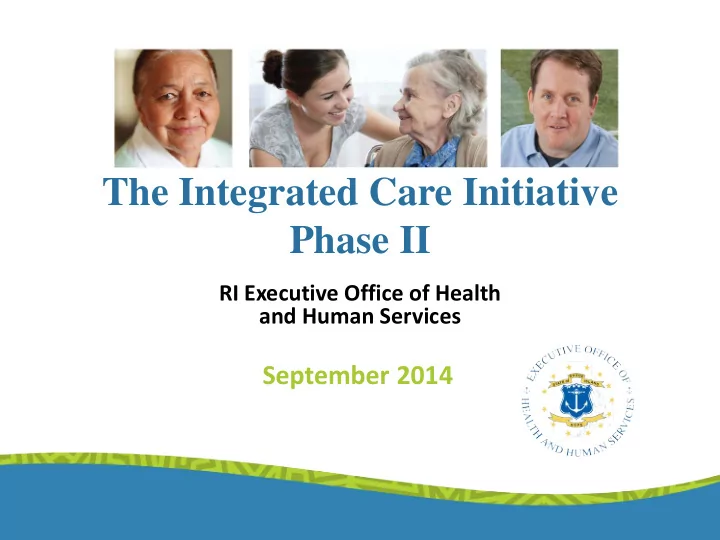
The Integrated Care Initiative Phase II RI Executive Office of - PowerPoint PPT Presentation
The Integrated Care Initiative Phase II RI Executive Office of Health and Human Services September 2014 Presentation Overview ICI Phase II/ Financial Alignment Demonstration (FAD) Background National Landscape Current Status of
The Integrated Care Initiative Phase II RI Executive Office of Health and Human Services September 2014
Presentation Overview ICI Phase II/ Financial Alignment Demonstration (FAD) • Background • National Landscape • Current Status of States • Impressions Based on State Experience • Rhode Island FAD Plans to Date • Overview of Draft MOU Contents • Next Steps
FAD Background: National Landscape • The Affordable Care Act of 2012 gives states opportunities to align financing and care for individuals with Medicare and Medicaid or “dual eligibles.” • As a result of the ACA, CMS is seeking to address long- standing coordination barriers between Medicaid and Medicare. • CMS’s planned Demonstrations to integrate care for dually eligible individuals features: • Either a FFS or capitated system; • Leverages combined Medicare and Medicaid funding and benefits and, • A CMS/State contract (for FFS model) or a three-way CMS/State/Health Plan contract (for capitated model).
Financial Alignment Demonstration, continued • 15 states were awarded funding from CMS to develop FAD models • Including money to process information with stakeholders – a key CMS requirement • RI applied but was not awarded this grant • Additional states developed FADs without CMS funding.
FAD Background: Current Status of States State Demonstration Type Enrollment Effective Date Arizona Capitated Mode; Not pursuing FAD as originally planned; currently exploring other delivery system options California Capitated 4/1/2014 Colorado Managed Fee For Service (MFFS) 11/1/2013 Connecticut MFFS TBD Hawaii MFFS Not pursuing FAD as originally planned Illinois Capitated 1/1/2014 Iowa MFFS TBD Idaho Capitated 4/1/2014 NOTE: Considering a delay due to inadequate plan participation – only one plan is currently in place Massachusetts Capitated 1/1/2014 Michigan Capitated 7/1/2014 Missouri MFFS 10/1/2012 Minnesota Administrative Simplification Not applicable
FAD Background: Current Status of States State Demonstration Type Enrollment Effective Date New Mexico N/A Not pursuing FAD as originally planned New York Capitated 7/1/2014 North Carolina MFFS TBD Ohio Capitated 4/1/2014 Oklahoma MFFS TBD Oregon N/A Not pursuing FAD as originally planned Rhode Island Capitated TBD South Carolina Capitated 7/1/2014 Tennessee Not pursuing FAD as originally planned; pursuing integration through a D-SNP model Texas Capitated 1/1/2014 Virginia Capitated 9/1/2014 Vermont Capitated 9/1/2014 Washington MFFS and Capitated MFFS: 7/1/2014 Capitated: 5/1/2014 Wisconsin Originally Capitated Not pursuing FAD as originally planned
Rhode Island FAD Plans to Date: Goals • Improves or maintains the health and quality of dual eligible beneficiaries’ lives through care that • is person-centered and integrated; • is coordinated across medical, behavioral, long-term and psychosocial supports and, • attends to transitions of care from the hospital or nursing home back to the community. • Focuses on re-balancing the long-term care and community-based systems. • Aligns financial and quality incentives to improve care.
RI FAD Plans to Date: Goals (continued) • Incorporates services provided through the Department of Behavioral Healthcare, Developmental Disabilities and Hospitals (BHDDH) including: o LTSS for adults with intellectual/developmental disabilities (IDD) and, o Intensive Behavioral Health Services for adults with serious and persistent mental illness (SPMI).
RI FAD Plans to Date: Who’s Eligible in RI? • Eligible population: 28,000 dual eligibles - 79 percent live in the community (~23,000) - 21 percent live in nursing homes (~ 5,000) Medicaid only adults with disabilities/chronic conditions with Long Term Services and Supports (LTSS). • Excluded populations: • Partial Medicare, residents at Eleanor Slater Hospital, Tavares Pediatric, incarcerated individuals and individuals enrolled in hospice/end-of-life care on the program start date.
RI FAD Plans to Date: Phased Plan • Rhode Island has a plan underway to rollout an FAD initiative Integrated Care Initiative in two phases: • Phase I: Delivery of services to dually eligible individuals with a greater focus on care integration within Medicaid services only. • Phase II: Movement to fully integrated Medicaid and Medicare services delivered by a single capitated health plan subject to CMS and state timelines Also to include: • LTSS for adults with intellectual/developmental disabilities (IDD) and • Intensive Behavioral Health Services for adults with serious and persistent mental illness (SPMI).
Memorandum of Understanding - Contents A. Demonstration Authority B. Contracting Process C. Enrollment D. Delivery System and Benefits E. Participant Protections, Participation and Customer Service F. Integrated Appeals and Grievances G. Administration and Reporting H. Quality Management I. Financing and Payment J. Evaluation
A. Demonstration Authority • RI intends to use the authority of the 1115 waiver to operate the program • Additional Medicare authority is needed and is provided in the Code of Federal Regulation, as amended by the Affordable Care Act, as well as in existing Medicare Advantage provisions of the CFR
B. Contracting Process • CMS and the State will sign a Memorandum of Understanding (MOU); • CMS, the State, and Neighborhood Health Plan of Rhode Island will sign a three-way contract; • CMS and the state will conduct a joint readiness review of the health plan (NHPRI).
C. Enrollment • Eligible populations will include all those currently eligible for Phase I – RI residents will full Medicare and Medicaid coverage – Medicaid-only clients with LTSS – Same exclusions apply (QMBs, SLMBs, QIs, Partial Medicare, residents at Eleanor Slater, residents at Tavares Pediatric, incarcerated individuals and individuals enrolled in hospice/end-of-life care on the program start date) • EOHHS intends to conduct an opt-out enrollment process, phased over several months, for enrollees already in RHO. • Because there are not additional health plans participating in Phase II, CMS will not allow an opt-out enrollment approach for all enrollees.
D. Delivery System and Benefits • Shifting provider payments away from fee-for-service to other forms of reimbursement (pay-for-performance, bundled payments) • Plans must provide full continuum of all Medicaid and Medicare covered services, including LTSS. • Opportunity to include additional benefits – SBIRT – Peer supports – Pain management – Others??
E. Participant Protections The FAD is not mandatory – clients can opt-out • Clients in Medicare Advantage would not be auto-enrolled, but • would be offered the opportunity to enroll in the MMP during open enrollment Transition period – access out of network providers if currently in • treatment Options counseling • Ombudsman*** • Materials produced at no greater than 6 th grade reading level • Participant participation on MMP plan advisory boards • No cost – sharing : RI will try to negotiate zero co-pays for • pharmacy as part of the agreement No balance billing for any reason for covered services •
F. Integrated Appeals Process • Medicaid and Medicare have 4 levels of appeal, but they are different • Timeframes also differ for Medicaid and Medicare • This will be an area of focus for the CMS/EOHHS negotiations Medicaid Medicare Health Plan Level 1 Health Plan Appeal Health Plan Level 2 Administrative Hearing External 3 rd level Medicare Appeals Council State Fair Hearing Federal District Court
G. Administration and Reporting • Develop CMS –state contract management team to conduct oversight jointly • Part D oversight continues as CMS responsibility, with communication to the state as appropriate • Consolidated reporting process for health plans • Leverage existing state and CMS tools for oversight and monitoring, e.g. tracking of complaints, review of utilization reports, etc. • Joint review of marketing materials by state and CMS
H. Quality Management Quality withhold measures specified by CMS and change with each • year of the demonstration. Examples of CMS-specified measures include: • – Nursing facility diversion – All cause readmissions – Certain HEDIS measures (follow-up after hospitalization for mental illness) – Fall risk reduction State specified measures – to be developed • External Quality Review requirement with a Quality Improvement • Organization (QIO) – Note – this is a current requirement in our Medicaid health plans
H. Quality Management, cont’d • Core set of quality measures specified by CMS (there are many) • Examples include: – Anti-depressant medication management – Screening for clinical depression and follow-up care – Care transitions – Breast cancer screening – CAHPS survey questions • Other measures will be state-specified and are in development
Recommend
More recommend
Explore More Topics
Stay informed with curated content and fresh updates.
